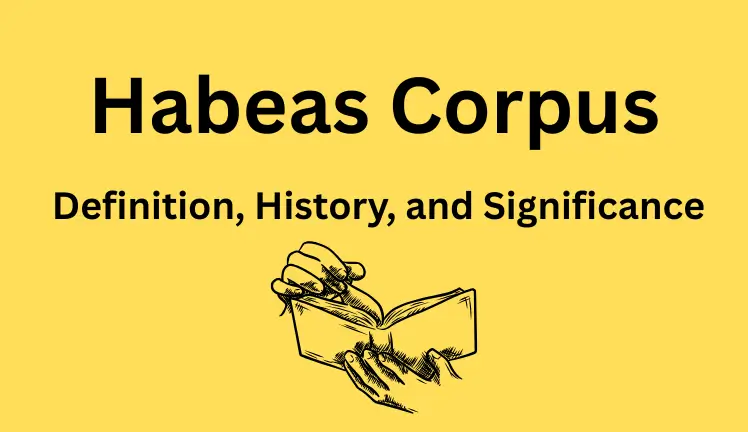Habeas corpus is a fundamental legal principle that serves as a safeguard against unlawful detention. The term, derived from Latin, means “you shall have the body.” It is an essential right in common law systems, allowing individuals to challenge the legality of their imprisonment before a court. This legal doctrine is critical for protecting personal freedom and preventing arbitrary detention by the authorities.

What is Habeas Corpus?
Habeas corpus is a judicial mandate requiring that a prisoner be brought before the court to determine whether the person’s detention or imprisonment is lawful. It serves as a crucial check on the executive and judicial powers, ensuring that no one is held without legal justification.
Key Aspects of Habeas Corpus:
- Judicial Review: Allows courts to evaluate the legality of an individual’s detention.
- Legal Safeguard: Protects against unlawful or arbitrary imprisonment.
- Human Rights Protection: Ensures that the state cannot detain an individual without showing legal cause.
- Application: Commonly used in cases where individuals are detained without trial or under questionable legal grounds.
Historical Background
The concept of habeas corpus has deep historical roots, tracing back to the Magna Carta of 1215. It was formally established in English law through the Habeas Corpus Act of 1679, which reinforced the right to challenge wrongful detention.
Significant Historical Milestones:
- Magna Carta (1215): The first document to guarantee the right of habeas corpus.
- Habeas Corpus Act (1679): Established formal procedures for challenging imprisonment in England.
- American Constitution (1787): Incorporated habeas corpus as a fundamental right, prohibiting its suspension except in cases of rebellion or invasion.
The Purpose of Habeas Corpus
Habeas corpus serves as a fundamental check on the government’s power to detain individuals. It ensures that no one can be imprisoned without due process, which is crucial for maintaining civil liberties.
Primary Objectives:
- Protection from Arbitrary Detention: Prevents imprisonment without a valid reason.
- Ensuring Due Process: Mandates that detainees have the opportunity to challenge their detention.
- Upholding Justice: Allows individuals to present evidence of wrongful or unlawful imprisonment.
Habeas Corpus in Modern Legal Systems
Today, habeas corpus remains a cornerstone of the legal system in many democratic countries. It is enshrined in various constitutions and is regarded as a fundamental human right.
Habeas Corpus in the United States:
- Found in Article I, Section 9 of the U.S. Constitution.
- Can only be suspended in cases of rebellion or invasion.
- Historically used in landmark cases, such as during the Civil War and the War on Terror, to challenge unlawful detentions.
Habeas Corpus in India:
- Protected under Article 32 and Article 226 of the Indian Constitution.
- The Supreme Court and High Courts have the authority to issue habeas corpus writs to challenge illegal detention.
Notable Habeas Corpus Cases
- Rasul v. Bush (2004, USA): Affirmed the right of Guantanamo Bay detainees to file habeas corpus petitions.
- ADM Jabalpur v. Shivkant Shukla (1976, India): Controversial case where the Supreme Court upheld the suspension of habeas corpus during the Emergency.
- Boumediene v. Bush (2008, USA): Recognized the right of non-citizens held at Guantanamo Bay to seek habeas corpus relief.
Importance of Habeas Corpus
The right to habeas corpus is indispensable for maintaining the rule of law and safeguarding individual liberties. Without it, governments would have unchecked power to detain individuals without reason or accountability.
Why It Matters:
- Prevents Abuse of Power: Acts as a critical counterbalance to arbitrary state action.
- Supports Democratic Values: Upholds the fundamental right to freedom from unlawful detention.
- Protects Human Rights: Ensures that legal procedures are followed before depriving someone of their liberty.
Challenges to Habeas Corpus
Despite its importance, habeas corpus rights have been challenged and suspended during emergencies, such as wartime or national crises. Governments often justify such actions in the interest of national security. However, these suspensions remain controversial and subject to judicial scrutiny.
Conclusion
Habeas corpus is a vital legal safeguard that protects individuals from wrongful detention. Its importance in modern democratic societies cannot be overstated, as it ensures that liberty is not compromised by arbitrary state actions. Understanding habeas corpus is essential for appreciating the balance between state power and individual rights.
Cache Memory: Definition, Function & Role in Reducing Processor-Memory Mismatch
FAQs– Habeas Corpus
1. Can habeas corpus be suspended?
Yes, it can be suspended during emergencies, such as war or rebellion, as seen in the U.S. Constitution and the Indian Constitution.
2. What is a writ of habeas corpus?
It is a court order demanding that a detainee be brought before a judge to assess the legality of their detention.
3. Is habeas corpus applicable worldwide?
While its application varies, many democratic nations uphold the right to habeas corpus as part of their judicial system.
4. What happens if habeas corpus is suspended?
When suspended, individuals may be detained without immediate judicial review, often justified during national emergencies.